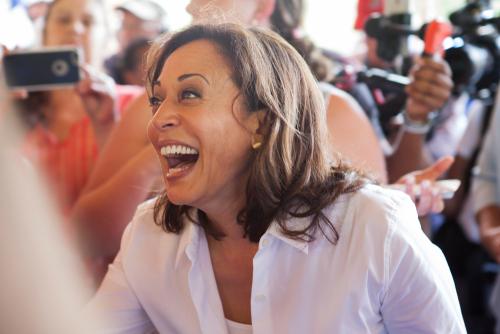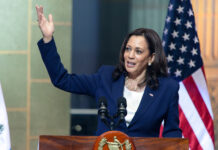
As political winds shift and the nation’s leadership faces unprecedented challenges, Vice President Kamala Harris finds herself in a precarious position. Despite being in a prime spot to ascend as the Democratic Party’s standard-bearer, her popularity ratings are not reflecting the confidence one might expect for someone of her stature, particularly among black voters—a key demographic for the party.
The recent USA Today/Suffolk University Poll has shed light on a concerning trend for the Vice President. While President Joe Biden navigates through an impeachment inquiry and public scrutiny over his age and cognitive abilities, Harris’s potential to lead the ticket seems undermined by her less-than-favorable polling numbers. This is especially notable given her historic role as the first Black and Asian-American woman to hold the office and her educational background at Howard University, a prestigious Historically Black College and University (HBCU).
I know he’s a socially awkward weirdo, wears undercover high heels, has a wife who looks like Eddie Munster, cackles like Kamala, and has about 6% in the polls. What else am I missing? https://t.co/0b8qJdK7eF
— Amy Moreno (@VivaLaAmes11) December 27, 2023
Harris’s outreach efforts, including a tour of HBCUs, appear to have fallen short of making a significant impact. The poll reveals that her job approval ratings lag behind those of President Biden, even within the African American community—56% compared to Biden’s 68%. Among younger voters under 35, her numbers are also lower, highlighting a disconnect with the very groups that could be pivotal in any future electoral success.
The Vice President’s overall job approval rating stands at 33% approve and 57% disapprove, with a substantial 40% expressing strong disapproval. These figures contrast starkly with the President’s 39% approval rating, despite his own challenges. Such statistics are alarming for a Vice President who would typically be groomed for future leadership.
Deep thoughts with Kamala Harris pic.twitter.com/biO50WLyki
— NahBabyNah (@NahBabyNah) January 1, 2024
Moreover, Harris’s performance in key areas of responsibility has come under fire. Her role as the point person to address the root causes of mass migration at the southern border has been met with criticism as the crisis continues unabated. The influx of illegal crossings has only intensified, casting doubt on her effectiveness in this crucial policy area.
Her public persona has also become a point of contention. Often characterized by a communication style that has been mocked by opponents and caused discomfort among supporters, Harris’s ability to connect with the electorate is questioned. Additionally, reports of a high staff turnover rate suggest internal issues within her team, further complicating the narrative around her leadership capabilities.
In what some might consider a twist of irony, Harris’s unpopularity may serve as a form of ‘impeachment insurance’ for President Biden. The notion that she is so unfavorably viewed could dissuade both Republicans and Democrats from pursuing impeachment to its ultimate conclusion, fearing that her presidency might prove even less palatable.
As the political landscape evolves, it remains to be seen how Vice President Kamala Harris will navigate these choppy waters. With the next election cycle on the horizon, the Democratic Party faces tough decisions on how to rally its base and present a united front. For now, Harris’s role and her potential ascent to the presidency seem clouded by a confluence of skepticism and waning support, even among those who should be her staunchest allies.












